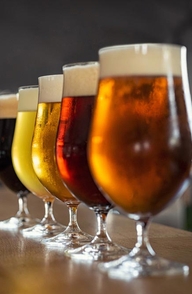Start 14-Day Trial Subscription
*No credit card required

Importance of Beer Knowledge in United States and Canada Bars
Discover how comprehensive beer knowledge can elevate bartending skills and enhance customer experiences in bars across the United States and Canada. Learn about diverse beer styles, professional development opportunities, and the cultural impact of beer.
In the fast-paced world of bartending, where trends change quickly and customer tastes fluctuate frequently, having a thorough understanding of beer is essential. Whether it's a small pub in Toronto or a crowded bar in New York City, beer knowledge not only improves the bartender's skills but also the whole patron experience. From comprehending diverse beer flavors to perfecting pouring procedures, this article explores the significance of beer knowledge in bars across the United States and Canada, along with avenues to acquire such expertise.
Understanding Beer Styles
Beer aficionados and casual drinkers alike appreciate a bartender who can guide them through the vast landscape of beer styles. From crisp lagers to powerful stouts, each style provides a distinctive sensory experience. A bartender with expertise of numerous varieties can recommend the ideal brew to match a customer's taste preferences and complement their food choices. Understanding the intricacies of various beer styles allows bartenders to create diverse and appealing beer menus that cater to a wide range of tastes. Enrolling in reputable institutions like the Boston Bartending School can provide aspiring bartenders with the knowledge and skills necessary to excel in this aspect of their craft, ensuring they can confidently navigate the world of beer and offer top-notch service to their patrons.
Enhancing Customer Service
In today's competitive hospitality business, great customer service differentiates establishments. Beer expertise enables bartenders to connect with customers on a deeper level, encouraging trust and commitment. When consumers believe their bartender is knowledgeable about beer, they are more inclined to seek recommendations, ask questions, and return for future visits. Furthermore, knowledgeable bartenders can provide valuable insights into the brewing process, beer origins, and food pairings, enriching the overall drinking experience.
Professional Development Opportunities
For aspiring bartenders looking to hone their craft, there are numerous avenues to acquire beer knowledge. Formal education programs, course for bartenders in Canada or the United States, often include modules dedicated to beer appreciation and service. These programs cover topics ranging from beer history and brewing techniques to proper storage and serving practices. Additionally, industry certifications, such as the Cicerone Certification Program, offer advanced training for beer professionals seeking to deepen their expertise and credibility.
On-the-Job Training and Experience
While formal schooling gives a solid foundation, nothing surpasses practical experience behind the bar. Many bartenders improve their beer knowledge through on-the-job training, becoming acquainted with various beer brands, flavors, and customer preferences. Working in a diversified bar environment exposes bartenders to a wide range of beer varieties and gives them the opportunity to experiment with new products and trends. This practical practice gradually boosts their confidence and proficiency in selling beer to customers.
Community Engagement and Networking
Attending beer festivals, tastings, and industry events is another valuable way for bartenders to expand their beer knowledge. These gatherings offer opportunities to sample a variety of beers, interact with brewers and industry experts, and stay abreast of emerging trends. Networking within the beer community can lead to valuable connections, mentorship opportunities, and access to exclusive educational resources. By immersing themselves in the vibrant beer culture, bartenders can continuously enrich their understanding and appreciation of the craft.
Promoting Responsible Consumption
In addition to serving as ambassadors of beer culture, bartenders play a crucial role in promoting responsible alcohol consumption. Beer knowledge enables bartenders to educate patrons about the importance of moderation, the effects of alcohol on the body, and the concept of designated drivers. By fostering a safe and inclusive drinking environment, bartenders contribute to the overall well-being of their patrons and communities.
The Cultural Impact of Beer
Beer is not merely a beverage; it's a cultural phenomenon deeply ingrained in the social fabric of both the United States and Canada. Understanding the history, traditions, and regional variations of beer adds depth to the bartender's expertise. By delving into the rich tapestry of beer culture, bartenders can engage patrons in conversations about local breweries, seasonal releases, and the role of beer in celebrations and rituals. This cultural immersion enhances the overall drinking experience and fosters a sense of community within the bar.
Embracing Sustainability and Craftsmanship:
In recent years, there has been an increased emphasis on sustainability and craftsmanship in the beer sector. Bartenders who understand sustainable brewing procedures and artisanal techniques can meet the changing preferences of ecologically concerned customers. By championing local breweries that prioritize ethical sourcing, eco-friendly packaging, and innovative brewing methods, bartenders contribute to a more sustainable and socially responsible beer culture.
In the ever-evolving landscape of bars and pubs across the United States and Canada, beer knowledge remains a cornerstone of exceptional bartending. From guiding patrons through diverse beer styles to enhancing customer service, promoting responsible consumption, and embracing cultural and environmental awareness, the benefits of beer expertise are manifold. Whether acquired through formal education, on-the-job training, or community engagement, a deep understanding of beer elevates the bartender's craft and enriches the patron experience. As beer continues to capture the hearts and palates of enthusiasts worldwide, bartenders equipped with comprehensive beer knowledge will undoubtedly remain in high demand, shaping the future of the hospitality industry.



